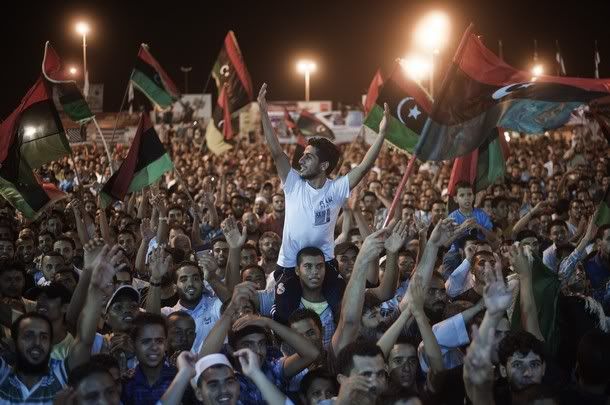The Libyan Revolution has largely succeeded, and this is a moment of celebration, not only for Libyans but for a youth generation in the Arab world that has pursued a political opening across the region. The secret of the uprising’s final days of success lay in a popular revolt in the working-class districts of the capital, which did most of the hard work of throwing off the rule of secret police and military cliques. It succeeded so well that when revolutionary brigades entered the city from the west, many encountered little or no resistance, and they walked right into the center of the capital. Muammar Qaddafi was in hiding as I went to press, and three of his sons were in custody. Saif al-Islam Qaddafi had apparently been the de facto ruler of the country in recent years, so his capture signaled a checkmate...
The end game, wherein the people of Tripoli overthrew the Qaddafis and joined the opposition Transitional National Council, is the best case scenario that I had suggested was the most likely denouement for the revolution...
I do not mean to underestimate the challenges that still lie ahead– mopping up operations against regime loyalists, reestablishing law and order in cities that have seen popular revolutions, reconstituting police and the national army, moving the Transitional National Council to Tripoli, founding political parties, and building a new, parliamentary regime. Even in much more institutionalized and less clan-based societies such as Tunisia and Egypt, these tasks have proved anything but easy. But it would be wrong, in this moment of triumph for the Libyan Second Republic, to dwell on the difficulties to come. Libyans deserve a moment of exultation.

His top ten myths are as follows (you can read his response to each myth at the link):
1. Qaddafi was a progressive in his domestic policies.
2. Qaddafi was a progressive in his foreign policy.
3. It was only natural that Qaddafi sent his military against the protesters and revolutionaries; any country would have done the same.
4. There was a long stalemate in the fighting between the revolutionaries and the Qaddafi military.
5. The Libyan Revolution was a civil war.
6. Libya is not a real country and could have been partitioned between east and west.
7. There had to be NATO infantry brigades on the ground for the revolution to succeed.
8. The United States led the charge to war.
9. Qaddafi would not have killed or imprisoned large numbers of dissidents in Benghazi, Derna, al-Bayda and Tobruk if he had been allowed to pursue his March Blitzkrieg toward the eastern cities that had defied him.
10. This was a war for Libya’s oil.
UPDATE: If you want great analysis coupled with a lot of information and history, go check out Matt Osborne's latest.




No comments:
Post a Comment